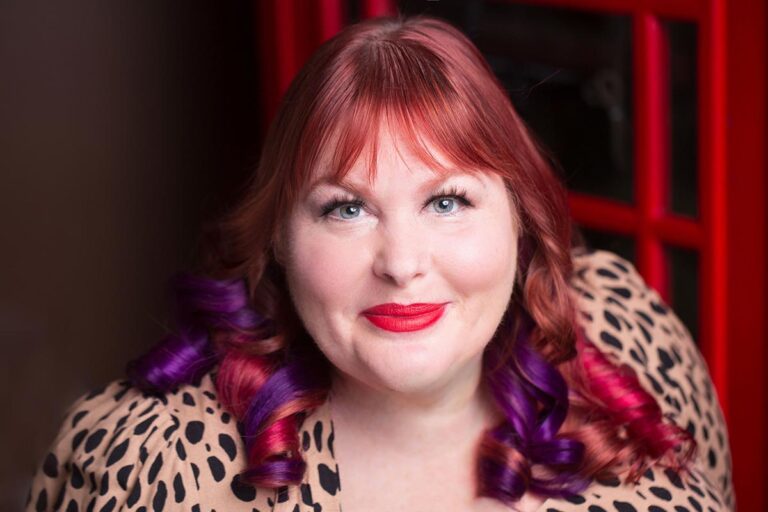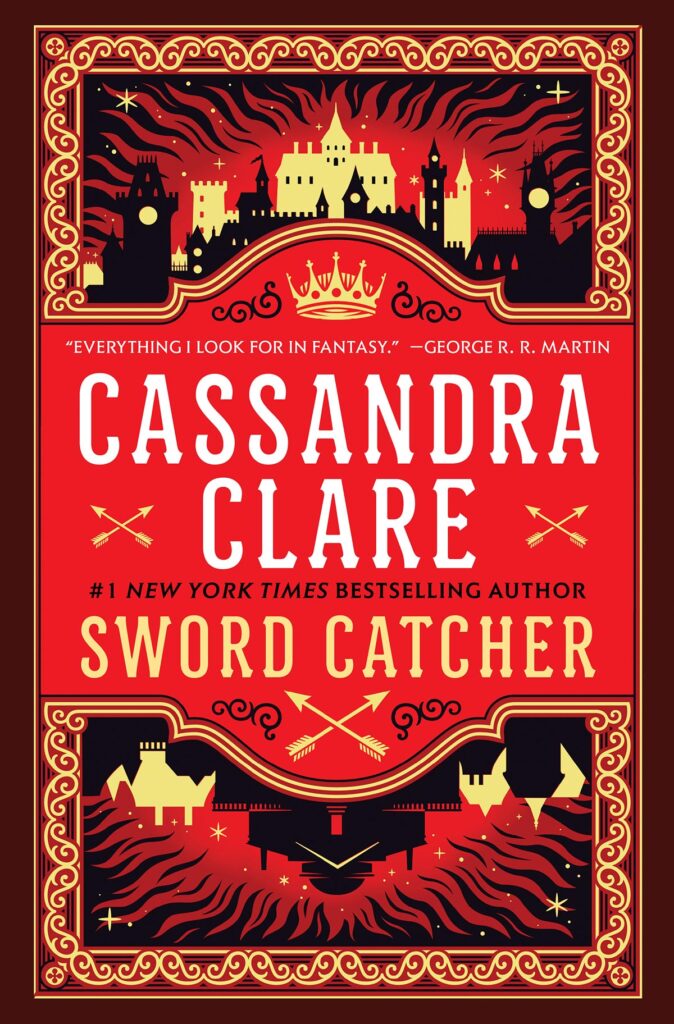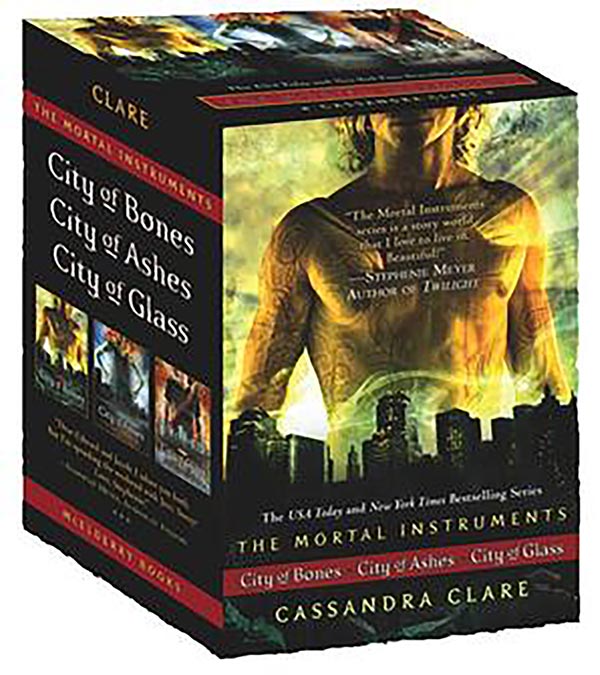
To fantasy readers, it’s very likely that Jewish author Cassandra Clare was one of your entry points into the genre. For close to 20 years, Clare has been a staple of young adult fantasy.
Now, the No. 1 New York Times bestselling author has entered new territory. Clare’s first high fantasy and adult novel “Sword Catcher” was released on October 10, 2023.

“Sword Catcher” follows Kel, an orphan and the body double for Prince Conor Aurelian. Kel has been raised alongside the king, but knows that eventually he will have to die for Conor.
Protagonist Lin Caster is a member of the Ashkar, an insular community that still possesses magical abilities and lives in walled-off areas of Castellane. As a doctor, Lin must leave her community walls to treat the sick, but is limited by the government in what she can learn.
Read more: Jewish romance authors break down their latest novels and why we need more Jewish stories
Lin and Kel are brought together after a failed assassination attempt and fall into the world of the Ragpicker King, the ruler of Castellane’s criminal underworld.
With the novel becoming an instant New York Times bestseller and receiving positive reviews from fantasy juggernauts, Unpacked spoke to Clare about the Jewish inspirations behind “Sword Catcher” and the importance of Jewish representation in fantasy novels.
A longtime fantasy reader, Clare wanted more Jewish representation
As a child, Clare devoured science fiction and fantasy novels from her father’s library. Her parents wanted her to have access to any book she found interesting, and her grandfather, a producer of science fiction and horror movies, encouraged her to explore genre fiction. As a result, she was immersed in the world from an early age.
“Fantasy was the genre that spoke to me the most,” Clare said. “There’s something about the way that they sort of transform real-life issues into metaphor that feels applicable to everyone.”
However, Clare found that many aspects of fantasy novels were not accessible to her as a Jewish reader.
“Growing up and reading fantasy…it felt to me often when I was reading that there’s a strong Christian tradition in [the genre], and it often made me feel like I was in some way left out or it wasn’t for me,” she said.
“I thought, wouldn’t it be fun for a reader like me to experience a book where the magical resonances feel familiar?” she added.
Clare specifically mentioned C.S. Lewis’ “The Chronicles of Narnia,” which emphasizes that only Christians can stay in Narnia; others are damned to live in the sinful real world. Clare added that she struggled with her favorite fantasy worlds excluding Jews like her.
Read more: 13 Jewish children’s book authors who shaped your upbringing
“Sword Catcher” incorporates Jewish magic into its world
Eventually, with her series “The Shadowhunter Chronicles,” Clare found her way into urban fantasy — novels with fantastical elements set in real-life cities. As of 2023, 17 main books and nine companion novels have been released in the series.
Despite two series of the larger chronicles left to finish, Clare began looking for other projects to pursue and decided she was ready to sink her teeth into the world of high fantasy.
Even after 50 million copies of her books were published and translated into 35 languages, Clare still was daunted by her foray into new writing territory, since her name had become synonymous with her hit demon-hunting series for so long.
“I definitely went into it knowing that it was going to be this huge challenge and that it needed to be very different from the kind of books that I’ve written before,” she said.
However, Clare was intrigued by the opportunity to write something new, which would allow her to delve into more adult themes that she hadn’t explored in her previous work. Instead of coming of age and first love and loss, the characters of “Sword Catcher” are more established in their lives and have already loved and lost.
“Sword Catcher” also gave Clare the opportunity to delve into Jewish history and folklore, something she has strived to do since she began writing.
“I always wanted to write a book where I could integrate Jewish tradition and magic. And so when I first came up with the concept for the book, I remember thinking, here’s a place where I could bring in a Jewish magic system,” Clare said.
The Ashkar’s magic resembles gematria where letters have assigned values. The Ashkar arrange letters to form words with magical properties, and then inscribe these words into silver talismans for protection, mirroring a practice found in Jewish history.
Clare explained that the story of King Solomon controlling demons with a ring bearing God’s unpronounceable name significantly influenced her magic system. The Ashkar’s magic has disappeared now that their powerful word cannot be spoken.
“There’s a lot in the Talmud and Midrash and in books of Jewish folklore and mysticism about words, which is not surprising because Jews are people of the book,” Clare said.
Clare recalled a story her grandparents told her about a rabbi who could read the Book of Life and thereby know when people would die. No one else could read the book. Clare was fascinated by the idea that “the difference between having magic and not having magic is the ability to read or not to read.”
Clare created a people to resonate with Jewish readers
Since her story unfolds in a completely different universe, Clare couldn’t include actual Jewish characters. However, she wanted to craft a culture that would feel familiar to Jewish readers, one that shares values with Judaism and draws from Jewish mythology.
“The Ashkar are a people that I hope will resonate with Jewish readers and non-Jewish readers who are familiar with Jewish culture,” Clare said. “There’s a Hebrew-derived language that they speak [and] a lot of…things that people will recognize in their culture.”
The Ashkar are a Diaspora culture who are ghettoized in Castellane, like many Jewish communities were across Europe. The Ashkar mobilize shomrim or “watchers” of the community, as the Jews of Rome did.
“Jews are in a place, not of a place,” Clare said, noting that the Ashkar embody this sense of not belonging to any one location.
In addition, like ancient Jewish communities, the Ashkar have a sanhedrin, a tribunal overseen by a figure akin to a high priest.
To prepare for crafting Castellane, Clare took multiple tours of Jewish Venice, to learn more about the Jewish ghetto which existed in the city during the Roman Empire.
However, the ruins of the ghetto have not been visible for centuries, so Clare also traveled to the Southwest of France, touring Jewish sites in the region, as many Jews fled to France when they were expelled from Spain.
Through the character of Lin, Clare wanted to explore the historical tensions between Jewish people and the broader societies they resided in. Like Jewish physicians during medieval and Renaissance Europe, the Ashkar are recognized as exceptional healers.
“We’re all familiar with the sense of a society that doesn’t trust Jews but needs them, values them for some skills that they have, and yet rejects them. I wanted to create that kind of tension where the Ashkar are indispensable because they have this medical knowledge and magical knowledge, but they are resented for having that power,” Clare said.
Crafting the Ashkar posed different challenges than creating her now-famous Jewish character: Simon Lewis
The Ashkar are not Clare’s first characters informed by Jewish history and culture. In the “Mortal Instruments” novels, Clare created Simon Lewis, her protagonist’s Jewish best friend thrust into the world of the supernatural.

Simon plucks the cross out of the hands of someone trying to ward him away nonchalantly with the remark of “wrong religion.”
He snarks that he doesn’t go Christmas caroling and only knows the dreidel song. Simon reflects the life of many Jewish teenagers, except he must grapple with his relationship to Judaism when he is turned into a vampire.
Clare felt that vampires, whose lore is wrapped around a fear of crosses and holy water, might not resonate as strongly with Jewish readers.
She wanted Jewish readers to have a deeply relatable experience akin to what Christians might feel with “Dracula.” In her story, Simon can’t bear to look at the Star of David and chokes on the words when he tries to recite the Shema, thinking he’s nearing death.
“I’ve spent my whole life reading books that are aimed at people who aren’t my religion. And I’ve continued to read books and love books, and it’s not been a hang-up for me. So why should it be a hang-up for other people?” she said.
Initially, Clare feared that Simon’s strong Jewish identity might limit his appeal to a broader audience. However, the overwhelmingly positive feedback from Jewish readers, who saw their own experiences recognized in Simon, inspired her to further infuse her writing with her cultural background and personal experiences as Simon’s character developed.
However, with the Ashkar, Clare had to blend Jewish history with the lore and world-building that she was crafting for “Sword Catcher,” a new challenge for the veteran writer.
While creating Simon, Clare drew on her experiences and those of her friends. Since the Ashkar live in a medieval world, she had to combine historical research with the fantasy elements she wanted in “Sword Catcher.”
“When you’re writing a character like Simon who is Jewish, you’re drawing on some personal experience and you’re drawing on what it means to be Jewish in the world in which we’re a very small percentage of people,” Clare said.
“With the Ashkar, I had to think how do I create a fantasy religion that holds values and echoes and resonances of Judaism and Jewish culture without being Judaism?” she added.
Clare hopes that Jewish and non-Jewish readers will finish “Sword Catcher” with a greater understanding of Jewish mysticism and history, and feel inspired to delve deeper into the lore of Jewish magic and fantasy.
Clare believes that Jewish readers find significant value in seeing their cultural heritage reflected in science fiction and fantasy. In such moments, “we recognize it as part of this enormous tapestry of story, and that is our history,” Clare said.
Originally Published Nov 9, 2023 05:29PM EST
